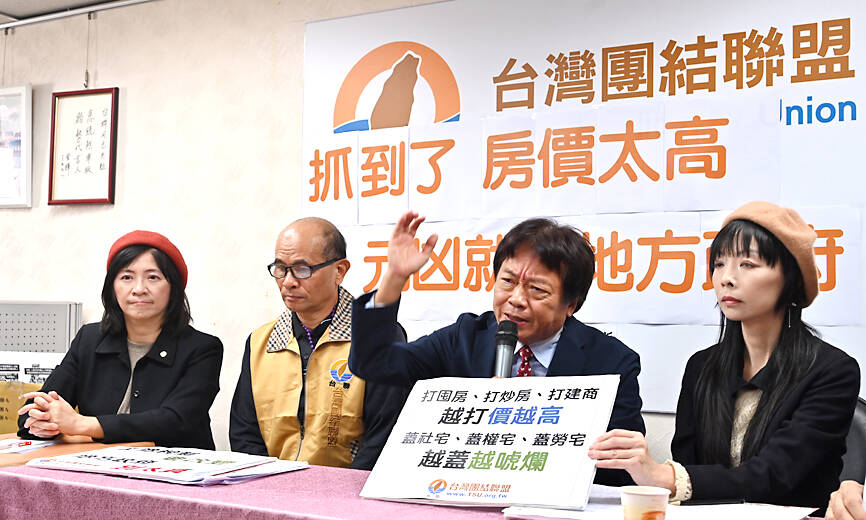Issues of housing justice and steep real-estate prices have led to dissatisfaction among young voters, who are turning away from the two major parties, the Taiwan Solidarity Union (TSU) said yesterday, blaming unreasonably high housing taxes collected by local governments.
“The ruling Democratic Progressive Party (DPP) government has taken up measures to bring down property prices and has promoted fairness and housing justice for years, but housing prices in cities are still climbing,” TSU Chairman Liu Yi-te (劉一德) told a news conference at the party’s office in Taipei.
Liu said these measures include heavy fines and other punishments to combat property speculation by investors, as well as a registration requirement for the actual price of a transaction to prevent the recording of inflated prices and deter owners and agents from taking advantage of the opaque process, he said.

Photo: Liu Hsin-de, Taipei Times
In recent years, one main reason for the surging prices is rezoning by local governments, opening plots for farming and industrial use, and for real-estate development, as the land can increase in assessed value by 10 times or more overnight, while local governments make huge financial gains by collecting the Land Value Increment Tax, which could be as much as 10 to 20 percent, Liu said.
This has been a major source of tax revenue for Taiwan’s six special municipalities in recent years and is the main driver of high real-estate prices, he said.
High property prices cause the younger generation to choose not to marry or raise a family, creating a declining birthrate, resulting in sectors of “dissatisfied, frustrated” young voters who are turning against the DPP and the Chinese Nationalist Party (KMT), he said.
To drive down prices and enact fairer policies, former TSU legislator Chou Ni-an (周倪安) provided several recommendations, including for the government to build more social housing and subsidize housing for younger people
On taxes from land rezoning, TSU legislator-at-large candidate Chang Teng-kai (張登凱) said that 30 percent of these tax revenues should be allocated specifically toward achieving housing justice, such as the provision of financial assistance to younger people for purchasing or renting a home, and housing subsidies for working-class people and senior citizens.
Chang said that taxes collected by local governments should be put into a dedicated “public housing assistance and saving fund” to help younger generations, laborers and senior citizens in subsidizing their rent or first-time home, or go into building social housing units.
TSU social movement department head Ou Yang Jui-lien (歐陽瑞蓮) said that the government could learn from Singapore in providing fair and low-cost housing for all of society.
Singapore has constructed extensive social housing for its citizens, and the monthly fees are not based on the land values of a particular city section, but rather is means tested in which working-class households would pay in accordance with their lower monthly income, while those with a higher monthly salary would pay a higher rate, she said.

Three Taiwanese airlines have prohibited passengers from packing Bluetooth earbuds and their charger cases in checked luggage. EVA Air and Uni Air said that Bluetooth earbuds and charger cases are categorized as portable electronic devices, which should be switched off if they are placed in checked luggage based on international aviation safety regulations. They must not be in standby or sleep mode. However, as charging would continue when earbuds are placed in the charger cases, which would contravene international aviation regulations, their cases must be carried as hand luggage, they said. Tigerair Taiwan said that earbud charger cases are equipped

Foreign travelers entering Taiwan on a short layover via Taiwan Taoyuan International Airport are receiving NT$600 gift vouchers from yesterday, the Tourism Administration said, adding that it hopes the incentive would boost tourism consumption at the airport. The program, which allows travelers holding non-Taiwan passports who enter the country during a layover of up to 24 hours to claim a voucher, aims to promote attractions at the airport, the agency said in a statement on Friday. To participate, travelers must sign up on the campaign Web site, the agency said. They can then present their passport and boarding pass for their connecting international

UNILATERAL MOVES: Officials have raised concerns that Beijing could try to exert economic control over Kinmen in a key development plan next year The Civil Aviation Administration (CAA) yesterday said that China has so far failed to provide any information about a new airport expected to open next year that is less than 10km from a Taiwanese airport, raising flight safety concerns. Xiamen Xiangan International Airport is only about 3km at its closest point from the islands in Kinmen County — the scene of on-off fighting during the Cold War — and construction work can be seen and heard clearly from the Taiwan side. In a written statement sent to Reuters, the CAA said that airports close to each other need detailed advanced

Tropical Storm Fung-Wong would likely strengthen into a typhoon later today as it continues moving westward across the Pacific before heading in Taiwan’s direction next week, the Central Weather Administration (CWA) said. As of 8am, Fung-Wong was about 2,190km east-southeast of Cape Oluanpi (鵝鑾鼻), Taiwan’s southernmost point, moving westward at 25kph and possibly accelerating to 31kph, CWA data showed. The tropical storm is currently over waters east of the Philippines and still far from Taiwan, CWA forecaster Tseng Chao-cheng (曾昭誠) said, adding that it could likely strengthen into a typhoon later in the day. It is forecast to reach the South China Sea